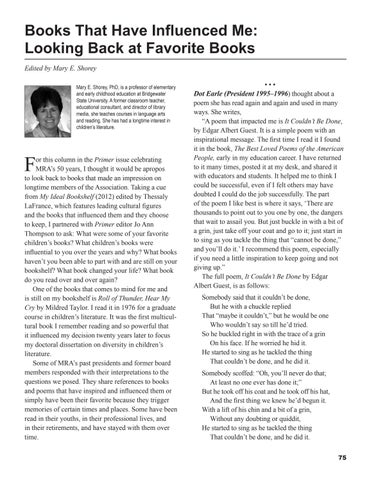Books That Have Influenced Me: Looking Back at Favorite Books Edited by Mary E. Shorey Mary E. Shorey, PhD, is a professor of elementary and early childhood education at Bridgewater State University. A former classroom teacher, educational consultant, and director of library media, she teaches courses in language arts and reading. She has had a longtime interest in children’s literature.
F
or this column in the P rimer issue celebrating MRA’s 50 years, I thought it would be apropos to look back to books that made an impression on longtime members of the Association. Taking a cue from M y Ideal Bookshelf (2012) edited by Thessaly LaFrance, which features leading cultural figures and the books that influenced them and they choose to keep, I partnered with P rimer editor Jo Ann Thompson to ask: What were some of your favorite children’s books? What children’s books were influential to you over the years and why? What books haven’t you been able to part with and are still on your bookshelf? What book changed your life? What book do you read over and over again? One of the books that comes to mind for me and is still on my bookshelf is R oll of Thunder, Hear My Cry by Mildred Taylor. I read it in 1976 for a graduate course in children’s literature. It was the first multicultural book I remember reading and so powerful that it influenced my decision twenty years later to focus my doctoral dissertation on diversity in children’s literature. Some of MRA’s past presidents and former board members responded with their interpretations to the questions we posed. They share references to books and poems that have inspired and influenced them or simply have been their favorite because they trigger memories of certain times and places. Some have been read in their youths, in their professional lives, and in their retirements, and have stayed with them over time.
••• Dot Earle (President 1995–1996) thought about a poem she has read again and again and used in many ways. She writes, “A poem that impacted me is I t Couldn’t Be Done, by Edgar Albert Guest. It is a simple poem with an inspirational message. The first time I read it I found it in the book, T he Best Loved Poems of the American People, early in my education career. I have returned to it many times, posted it at my desk, and shared it with educators and students. It helped me to think I could be successful, even if I felt others may have doubted I could do the job successfully. The part of the poem I like best is where it says, ‘There are thousands to point out to you one by one, the dangers that wait to assail you. But just buckle in with a bit of a grin, just take off your coat and go to it; just start in to sing as you tackle the thing that “cannot be done,” and you’ll do it.’ I recommend this poem, especially if you need a little inspiration to keep going and not giving up.” The full poem, I t Couldn’t Be Done by Edgar Albert Guest, is as follows: Somebody said that it couldn’t be done, But he with a chuckle replied That “maybe it couldn’t,” but he would be one Who wouldn’t say so till he’d tried. So he buckled right in with the trace of a grin On his face. If he worried he hid it. He started to sing as he tackled the thing That couldn’t be done, and he did it. Somebody scoffed: “Oh, you’ll never do that; At least no one ever has done it;” But he took off his coat and he took off his hat, And the first thing we knew he’d begun it. With a lift of his chin and a bit of a grin, Without any doubting or quiddit, He started to sing as he tackled the thing That couldn’t be done, and he did it. 75





